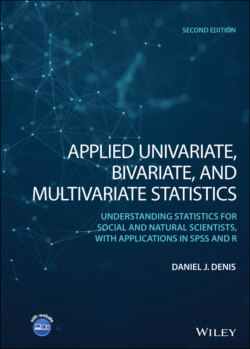Читать книгу Applied Univariate, Bivariate, and Multivariate Statistics - Daniel J. Denis - Страница 40
2.4.4 Ratio Scale
ОглавлениеThe most sophisticated scale of measurement is that of the ratio scale. It is the most sophisticated because it is the only scale for which we can speak meaningfully about ratios between competing measurement intervals. By “ratio,” we simply mean we have the power to make such statements as “object a is twice as large as object b.” Up to now, no other scale has allowed us to make such statements. For instance, in the interval scale, concluding that a is any factor greater than b made no sense. We did not have a starting point to base such conclusions. An IQ of zero did not necessarily mean the absence of intelligence. Rather, it was simply an arbitrary point on the IQ scale presumably denoting a particular quantity of IQ (even if, in all probability, very small).
What gives us license to make statements of ratios? The element of the ratio scale that permits us to make such statements is the fact that the ratio scale has at its origin a true zero point. When something is deemed measurable at the ratio scale, a measurement of zero actually means zero of the thing that is being measured. Was this fact true of the interval scale? No, because zero degrees Fahrenheit did not equate to there being zero temperature. “Zero” was simply an arbitrary value on the scale. However, the fact that I have zero coins in my pocket actually means that I have zero coins. “Zero” is said to be, in this case, “absolute,” meaning that there is truly nothing there.
Physical quantities such as weight, distance, velocity, motion, are all measurable at the ratio level. Variables such as reaction time in sensation experiments are also measurable at the ratio level. Phenomena such as intelligence, anxiety, attitude, are generally not. More often we deem them measurable at the interval level or less, and when we really get critical, it is even a stretch at times to consider the ordinal level of measurement as being satisfied for such variables. Then again, if we decided to operationally define anxiety by beats per minute of one's heart, then theoretically at least, one could conclude that an individual has zero anxiety if that individual has zero beats per minute (though of course, this could make for an awkward definition for the absence of anxiety!).
